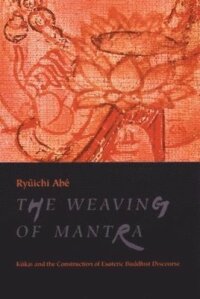🥳 Välkommen till BegagnadKurslitteratur.se (🌟Nya begagnadeskolböcker.se)
Läs mer
| ISBN | 9780231112871 |
| Format | Häftad (Paperback / softback) |
| Författare | Ryuichi Abe |
| Publiceringsår | 2000-10-01 |
| Förlag | Columbia University Press |
| Antal sidor | 620 |
| Språk | Engelska |
Häftad (Paperback / softback) • 2000-10-01
Ej tillgänglig
Ej tillgänglig
Ej tillgänglig
Ej tillgänglig
Få ett meddelande när denna bok säljes begagnad igen.
Boken The Weaving of Mantra släpptes år 2000 och är skriven av Ryuichi Abe.
Den består av 620 sidor och är skriven på engelska. Boken är utgiven av förlaget Columbia University Press.
Vi kunde inte hitta något pris på vad den kostar ny.The great Buddhist priest Kukai (774-835) is credited with the introduction and establishment of tantric -or esoteric -Buddhism in early ninth-century Japan. In Ryuichi Abe examines this important religious figure -neglected in modern academic literature -and his profound influence on Japanese culture. Offering a radically new approach to the study of early religious history -combining historical research, discourse analysis, literary criticism, and semiology -Abe contends that the importance of Kukai's transmission of esoteric Buddhism to Japan lay not in the foundation of a new sect but in his creation of a general theory of language grounded in the ritual speech of mantra. embeds Kukai within the fabric of political and social life in ninth-century Japan and explains how esoteric Buddhism played a crucial role in many societal changes in Japan -from the growth of monasteries into major feudal powers to the formation of the native phonetic alphabet, kana. As Abe illustrates, Kukai's writings and the new type of discourse they spawned also marked Japan's transition from the ancient order to the medieval world, replacing Confucianism as the ideology of the state.Abe begins by placing Kukai's life in the historical context of medieval Japan and the Ritsuryo state, then explores his interaction with the Nara Buddhist intelligentsia, which was seminal to the introduction of esoteric Buddhism. The author discusses Kukai's magnum opus, () and introduces a number of Japanese and Chinese primary-source texts previously unknown by Western-language scholars. Instead of tracing Kukai's thought through literal readings, explores the rhetorical strategies Kukai employed in his works, shedding valuable light on what his texts meant to his readers and what his goals were in creating a discourse that ultimately transformed Japanese culture. The great Buddhist priest Kukai (774-835) is credited with the introduction and establishment of tantric-or esoteric-Buddhism in early ninth-century Japan. In The Weaving of Mantra, Ryuichi Abe examines this important religious figure-neglected in modern academic literature-and his profound influence on Japanese culture.Offering a radically new approach to the study of early religious history-combining historical research, discourse analysis, literary criticism, and semiology-Abe contends that the importance of Kukai's transmission of esoteric Buddhism to Japan lay not in the foundation of a new sect but in his creation of a general theory of language grounded in the ritual speech of mantra. The Weaving of Mantra embeds Kukai within the fabric of political and social life in ninth-century Japan and explains how esoteric Buddhism played a crucial role in many societal changes in Japan-from the growth of monasteries into major feudal powers to the formation of the native phonetic alphabet, kana. As Abe illustrates, Kukai's writings and the new type of discourse they spawned also marked Japan's transition from the ancient order to the medieval world, replacing Confucianism as the ideology of the state. Abe begins by placing Kukai's life in the historical context of medieval Japan and the Ritsuryo state, then explores his interaction with the Nara Buddhist intelligentsia, which was seminal to the introduction of esoteric Buddhism.The author discusses Kukai's magnum opus, Ten Abiding Stages on the Secret Mandalas (Himitsu mandara jujushinron) and introduces a number of Japanese and Chinese primary-source texts previously unknown by Western-language scholars. Instead of tracing Kukai's thought through literal readings, The Weaving of Mantra explores the rhetorical strategies Kukai employed in his works, shedding valuable light on what his texts meant to his readers and what his goals were in creating a discourse that ultimately transformed Japanese culture.
Nu när du vet att du vill köpa denna bok begagnad, och den finns tillgänglig så trycker du på den gröna knappen under annonserna för att komma i kontakt med säljarna.
Säljaren skickar en köpesförfrågan till dig som du enkelt accepterar. Säljaren får din adress för att skicka boken och du får instruktioner om hur du ska Swisha.
När du är färdig med din kurs så är nästa rimliga steg att du säljer boken till nästa års kull.
Det är helt gratis att sälja en bok på BegagnadKurslitteratur.se!